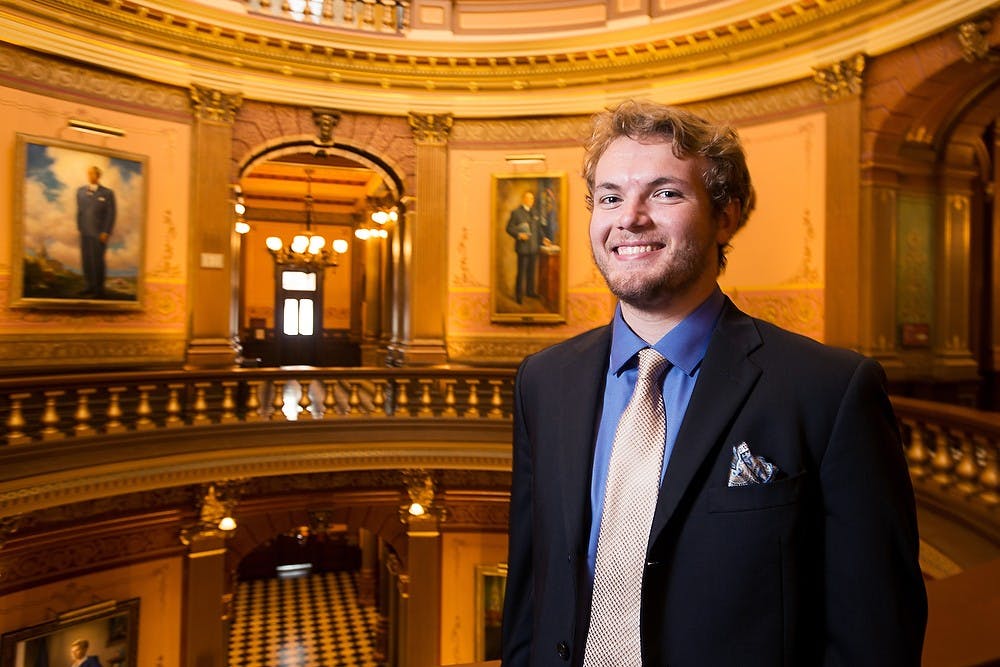In the upcoming weeks, candidate commercials will air on TV, signs will fill lawns and campaigners will go door-to-door to raise awareness for legislators.
This is an election year.

Social relations and policy and comparative cultures and politics senior Ryan Miller poses for a portrait, August 1, 2014, at the Michigan State Capitol. Miller is interning with the Michigan House of Representatives. Corey Damocles/The State News
In the upcoming weeks, candidate commercials will air on TV, signs will fill lawns and campaigners will go door-to-door to raise awareness for legislators.
This is an election year.
Michigan’s primary will be held on August 5, but voter turnout is usually less than the general election which will take place on November 4.
During the primary, voters are given the chance to nominate candidates on a partisan ticket.
While voting in the primary election is unpopular among the general public, student involvement in politics is even less so.
Students are capable of registering to vote using their school address, but misinformation claiming they could lose financial aid or dependency status steers some students away from the ballot box.
Unpopularity in politics
Social relations and policy, and comparative cultures and politics senior Ryan Miller said people tend to be skeptical about politics.
“Quite frankly, people think it’s like a dirty game,” Miller said.
While the subject of politics and the act of voting come off as unpopular, associate professor of political science Matt Grossmann said students should care about voting because the government plays a huge role in students’ lives.
Attending a state university partially funded by the government is one reason, Grossmann said, students should be politically informed.
However, Grossmann said students are more likely to vote in the general elections than the primary elections.
But MSU College Republicans Chairperson and public policy senior Lisa Jankowski said the primary elections are important.
Not voting in the primary elections gives voters less of an opportunity to have a choice in who represents them.
“If you don’t get involved before the general election ... you only get to choose between two candidates,” Grossmann said.
Among students, Grossmann said the national election holds more popularity than the state election.
Jankowski said students should educate themselves and not rely on social media when it comes to voting.
“As Americans, we have a responsibility to know who is representing us,” Jankowski said.
A learning experience
While student participation in the political process on the whole may be low, some MSU students make a point of participating through internships with political campaigns and at Michigan's Capitol, which stands just miles from MSU's campus.
Support student media! Please consider donating to The State News and help fund the future of journalism.
Miller said in classes taken through James Madison College, he is exposed to politics, but this summer he dove deeper into the topic through an internship.
Miller is an intern for Rep. Andy Schor (D-Lansing) at the House of Representatives.
Working at the House of Representatives, Miller said his tasks include tracking legislation and interacting with constituents.
Representative Schor does not have a primary component, therefore Miller said the “hardcore campaigning” has not yet begun.
Although he said he is unsure if he wants to enter the working world of politics, Miller said his internship experience taught him a lot and introduced him to some important mentors.
“The people I work with have been really good role models for me,” Miller said.
He added the internship has been a maturing experience for him because he is working in a professional setting and the opportunity will open doors for him later in life.
In addition to experiencing working in an office setting, Miller said interning with Rep. Schor has increased his knowledge on topics and issues.
“The last time I voted, there were a lot of things I didn’t know I was voting for,” Miller said. “(Now) I know what box I’m checking.”
Campus-wide involvement
On campus, the MSU College Democrats and MSU College Republicans work to raise awareness of issues while encouraging students to vote.
Each group holds specific events related to political issues throughout the year and hosts guest speakers.
Jankowski said when school resumes, the MSU College Republicans will also hold more events and invite candidates to speak.
In the past, the MSU College Republicans have held panels covering topics such as renewable energy and rallying against the Affordable Care Act, better known as “Obamacare.”
During the school year, the two groups also hold a debate around a number of partisan issues.
Jankowski said last year the debate was held halfway through the year, but she hopes this year it will be held at the beginning so more students will be involved.
MSU College Democrats President and comparative cultures and politics senior Brianna Shamsuddoha said her personal goal is to work on on bipartisanship with the MSU College Republicans.
Jankowski also said she would like for the MSU College Republicans to have more bipartisan events with the MSU College Democrats.
Shamsuddoha said the group has a goal to register 3,000 students to vote this fall, and added that students have a powerful voice that represents a large portion of the vote.
“College students, we have to be involved, we have to voice our opinions or we’re not going to be represented,” Shamsuddoha said.